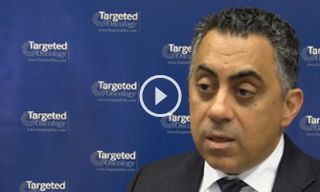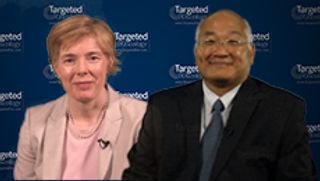
GI CANCERS
Latest News

In results from the phase III CROSS trial reported in the <em>Journal of Clinical Oncology, </em>neoadjuvant chemoradiotherapy failed to lower postoperative health-related quality of life compared with surgery alone for patients with esophageal or junctional cancer.<br />
Latest Videos

More News

According to findings from the phase III TERRA trial published in the <em>Journal of Clinical Oncology, </em>previously treated Asian patients with metastatic colorectal cancer saw a significant survival benefit with TAS-102 (trifluridine and tipiracil; Lonsurf) compared with placebo.

Boston University Medical Center has announced that Matthew Kulke, MD, will serve as its chief of the Section of Hematology/Oncology in the Department of Medicine, effective March 1, 2018. Kulke will also obtain the roles of deputy director of the BU-BMC Cancer Center, medical director of the Clinical Cancer Center at BMC, and the Zoltan Kohn Professor of Medicine at the Boston University School of Medicine.

Howard S. Hochster, MD, an internationally recognized leader in the development of cancer clinical trials, gastrointestinal oncology, and early phase cancer drugs, has joined Rutgers Cancer Institute of New Jersey as associate director for clinical research and chief of gastrointestinal medical oncology.

John L. Marshall, MD, chief, Division of Hematology/Oncology, Medstar Georgetown University Hospital, director, Otto J. Ruesch Center for the Cure of Gastrointestinal Cancer, discusses the progress that has been made with immunotherapy in the treatment of colorectal cancer.

Hans-Joachim Schmoll, MD, discusses updated CHARTA findings, the current role of chemotherapy in patients with metastatic CRC, and his predictions for the future CRC treatment landscape.

Leonard Saltz, MD, highlights the current go-to therapies and overarching questions for mCRC treatment.

Shubham Pant, MD, discusses therapeutic options for patients with metastatic CRC, while stressing the importance of clinical trials as an avenue to establish more novel treatment decisions in this setting.

John L. Marshall, MD, chief, Division of Hematology/Oncology, Medstar Georgetown University Hospital, director, Otto J. Ruesch Center for the Cure of Gastrointestinal Cancer, discusses when to order next-generation sequencing for a patient with metastatic colon cancer.

George P. Kim, MD, recently shared the treatment considerations and decisions he makes when treating patients with metastatic pancreatic cancer. Kim, a medical oncologist at 21st Century Oncology in Jacksonville, Florida, explained his treatment decisions based on 2 case scenarios during a <em>Targeted Oncology</em> live case-based peer perspectives dinner.

Chimeric antigen receptor T-cell therapy with bb2121 demonstrated an objective response rate of 94% in patients with relapsed/refractory multiple myeloma, according to findings from a dose-escalation study. The senior study author, James N. Kochenderfer, MD, presented updated findings from the study during the 2017 ASH Annual Meeting, and commented that 89% of patients had a very good partial response or better, and 56% of patients had a complete remission. <br />

Alan P. Venook, MD, recently discussed 2 cases of patients with colorectal cancer, and the treatment treatment considerations and decisions he would make when treating these patients. Venook, Shorenstein Associate Director for Program Development, Helen Diller Family Comprehensive Cancer Center, and professor, Department of Medicine, University of California San Francisco, discussed these cases during a <em>Targeted Oncology</em> live case-based peer perspectives dinner.<br />

Tim G. Larson, MD, discusses emerging data involving immunotherapy for patients with microsatellite instability (MSI)/microsatellite stable (MSS) CRC and highlights some of the identified molecular mutations in patients with CRC.

The use of targeted therapies in colon cancer has become increasingly important, with several options available for clinicans to choose between. In a review of recent updates incorporating molecularly targeted therapy use in the National Comprehensive Cancer Network guidelines, the evidence for these new recommendations are detailed in support of their use in patients with colon cancer.

A. David McCollum, MD, discusses the optimal management of CRC in the first-line setting and the ongoing research with checkpoint inhibitors designed to benefit larger groups of patients.<br />

Cathy Eng, MD, FACP, professor, Department of Gastrointestinal Medical Oncology, The University of Texas MD Anderson Cancer Center, discusses choosing between TAS-102 (Lonsurf) and regorafenib (Stivarga) in colorectal cancer.

In findings from the phase III JAVELIN Gastric 300 trial, survival was not improved with the anti–PD-L1 agent avelumab compared with chemotherapy in previously treated patients with gastric or gastroesophageal junction adenocarcinoma.<br />

In patients with hepatocellular carcinoma (HCC), pill burden and treatment costs were reduced, with a trend toward improved treatment completion, by lowering the dose of sorafenib (Nexavar), according to results from a retrospective, multi-institutional study.

Carlos Becerra, MD, discusses the current management and emerging therapies for patients with pancreatic cancer.

John L. Marshall, MD, Director, The Ruesch Center for the Cure of Gastrointestinal Cancers at Georgetown Lombardi Comprehensive Cancer Center, discusses decision making in the frontline treatment of patients with metastatic colon cancer.

Eileen O’Reilly, MD, associate director for clinical research at Memorial Sloan Kettering Cancer Center, discusses new developments in pancreatic cancer care.

Richard Kim, MD, recently shared the treatment considerations and decisions he makes when treating patients with metastatic colorectal cancer, including the role of mutation testing and location of the tumor. Kim, associate professor of oncology, Moffitt Cancer Center, explained his treatment decisions based on 2 case scenarios during a <em>Targeted Oncology</em> live case-based peer perspectives dinner.

Mike Cusnir, MD, co-director of gastrointestinal malignancies, Mount Sinai Medical Center, recently discussed the cases of 2 patients with metastatic colorectal cancer (mCRC).<br />

Vinod P. Balachandran, MD, Surgical Oncologist, Memorial Sloan Kettering Cancer Center, discusses an analysis to determine the unique antigen qualities of long-term survivors of pancreatic cancer during The Society for Immunotherapy of Cancer (SITC) 32nd Annual Meeting.

The researchers review intra-arterial therapies and the latest literature supporting their use, categorized by different tumor types.

Hans-Joachim Schmoll, MD, discusses updated CHARTA findings, the current role of chemotherapy in patients with metastatic CRC, and his predictions for the future CRC treatment landscape.


















































